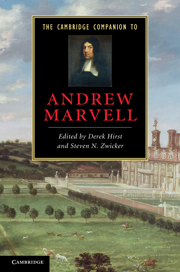Book contents
- Frontmatter
- 1 Introduction
- 2 The social modes of Marvell’s poetry
- 3 Marvell and the literary past
- 4 Borders and transitions in Marvell’s poetry
- 5 Thinking of gender
- 6 Marvell and the designs of art
- 7 Andrew Marvell’s citizenship
- 8 The green Marvell
- 9 A Cromwellian centre?
- 10 The poet’s religion
- 11 Adversarial Marvell
- 12 How to make a biography of Andrew Marvell
- Index
- Cambridge Companions to. . .
10 - The poet’s religion
Published online by Cambridge University Press: 28 March 2011
- Frontmatter
- 1 Introduction
- 2 The social modes of Marvell’s poetry
- 3 Marvell and the literary past
- 4 Borders and transitions in Marvell’s poetry
- 5 Thinking of gender
- 6 Marvell and the designs of art
- 7 Andrew Marvell’s citizenship
- 8 The green Marvell
- 9 A Cromwellian centre?
- 10 The poet’s religion
- 11 Adversarial Marvell
- 12 How to make a biography of Andrew Marvell
- Index
- Cambridge Companions to. . .
Summary
In 1928 Pierre Legouis characterized Andrew Marvell as ‘poète, puritain, patriote’. Marvell is pre-eminently a poet: that is why we read him today and why he is worth the attention of a volume of this kind. His ‘patriotism’ – by which Legouis meant his Whiggish criticism of Charles II, his opposition to the ‘potent and subtle’ French king Louis XIV, his assertion of Protestant liberty, and his defence of Parliament against corruption and intimidation – is even better appreciated today than it was in Legouis’s era thanks to the boom in academic studies of Marvell the politician, satirist and controversialist that culminated in the publication of the first scholarly edition of his prose works in 2003. Of Legouis’s three epithets, it is perhaps the middle term, ‘puritan’, that is now most difficult to associate with Andrew Marvell. The dour, killjoy, fundamentalist overtones of that label seem at odds with Marvell the lyrical poet, irreverent satirist and teasing writer who by turns encourages us to seize the day, to prize ‘delicious solitude’, or to see our social and political betters in all their human squalour.
Certainly Marvell’s public attachments – his association with Oliver and Richard Cromwell, his parliamentary career, and his polemics in defence of the Nonconformists – place him unambiguously on the godly side of the great ideological divide of seventeenth-century England. As one near contemporary summed him up, Marvell was ‘a man not well affected to the Church or Government of England’. But he was never spotted at any Nonconformist conventicle, never sat as a hearer of one of the capital’s many preaching ministers, never made a personal confession of faith – in fact, like all MPs, Marvell attended the services at St Margaret’s Westminster, received communion there, and took the required oaths of loyalty and conformity.
- Type
- Chapter
- Information
- The Cambridge Companion to Andrew Marvell , pp. 158 - 173Publisher: Cambridge University PressPrint publication year: 2010
- 1
- Cited by



